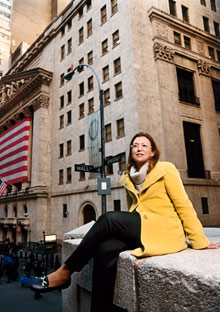When the Roof Falls In
Hit from All Sides
Janet Hanson, 56
Janet Hanson, 56

Photo: Rob Howard
PAGE 2
On February 12, 2007, Janet Hanson sat across from Katie Couric, being interviewed for CBS News. They were discussing the success of her company, 85 Broads, a network of 18,000 female professionals and students around the world who promote women's leadership in the workplace and beyond. A former vice president at Goldman Sachs, Janet had started the organization in 1997 for the firm's female employees and alumnae—the name, a play on its address (85 Broad Street). When she came up with the idea, she'd left Goldman to raise her first child and wanted to stay plugged into Wall Street. At that time, in 1997, she had already founded Milestone Capital—a money market fund company overseeing more than $2 billion in assets—and would stay in finance by later becoming a managing director at Lehman Brothers.
During her interview with Couric, Janet talked confidently about investing in other women. But she remembers thinking, "What did it really cost me?"
"There was this overwhelming sense of sadness and loss," she says. A few months earlier, her husband of 18 years had left her. "As the camera rolled," she says, "inside I'm dying because all I'm thinking about is him."
If that was a low point, it wasn't the first—or the last. In 2002, after being diagnosed with breast cancer, Janet underwent a bilateral mastectomy; then, to keep the cancer from spreading to her ovaries, had them removed as well, causing what doctors term traumatic menopause. Rebounding from that trauma, two years later she accepted the job at Lehman Brothers to bring in female talent—a mission perfectly in line with her goals at 85 Broads. She was paid largely in company stock. Convinced that the stock would maintain its value after it vested, she started plowing her own money, almost $5 million, into 85 Broads, expanding it into the global network it is today. By early 2007, she felt overextended and, with her marriage on the rocks, decided to trade her managing director job at Lehman for a two-year consulting contract. At her first opportunity, in February 2008, she cashed out about two thirds of her stock, but by then, due to the credit crisis, it had dropped from $82 to $48 a share. "That was not a happy thing. I was starting to be concerned about my luck," she says. "I couldn't turn my marriage around, or my health. ... There was this paralyzing dread that whatever could go wrong, would."
Then in September, the unthinkable happened: Lehman Brothers collapsed. Her stock became worthless. "I was in shock, absolute shock," she says.



